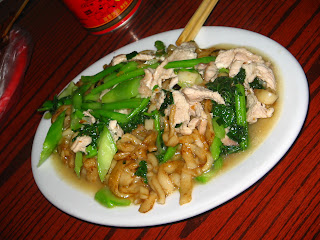Happy Boxing Day to All!

What is Boxing Day, you ask?
Overcome by my own shame at not knowing the meaning of one my homeland's holidays, I decided to do what I do best and research the historical meaning behind that Canadian holiday known as "Boxing Day".
For those of you who are utterly in the dark, Boxing Day takes place December 26th, the day after Christmas. It is celebrated in Canada, Britain, Australia, New Zealand and all those other "Commonwealth" countries. I guess when the US severed all ties with Britain after the revolution they kept Christmas but threw Boxing Day out. Wise choice.
As many a young child tend to do, I believed my mother's words when she told me that Boxing Day was simply the day everyone throws all their Christmas trash (including all the boxes containing those toys that "Santa" brought you) out to the curb. Logically it made sense. In the grand manner of all holidays, however, there are indeed deeper historical roots. Read on if you desire to be enlightened about this peculiar holiday.
Boxing Day most likely began in England sometime during the Middle Ages. There is, however, more than one explanation as to how it came about:
1. On Christmas Day, all the servants were required to slave away as usual and feed the Master and his family. Dec. 26th therefore was their day off. As the servants prepared to visit their families, the Master would "box up" all the leftover food and send it off with his servants so they could enjoy a belated Christmas dinner with their families.
2. The day after Christmas, when employees returned to work, they brought boxes along with them into which their employers would place gifts, usually coins (the equivalent of the modern-day Christmas bonus).
3. December 26th was traditionally the day the Church donation box was opened and the alms distributed to the needy.
4. On Boxing Day, people would capture the Wren, known as the king of birds, and place him in a box. He would then be introduced to each household in the village where people would ask for his blessing in ensuring a successful year.
So there you have it my friends. The reasons for that strange calendrical event called Boxing Day, each and every one as mundane as the reason my mother originally offered to me. Sorry to burst your bubble - believe me when I say that as the Canadian celebrating this holiday, I was disappointed when my research didn't reveal some swash-buckling, semi-legendary story with which I could brighten your lives.
But hey, knowledge is knowledge, however trivial, right?
So the next time you're at some Christmas cocktail party and some ignoramus inquires as to why there is a day called "Boxing Day", you can put on your best "Well, historically speaking. . ." face and prepare to watch their eyes glaze over as you enlighten them with the meaning of this humble little day.
And if you think we Canadians celebrate Boxing Day by asking some bird in a box to grant us a successful harvest, well then let me just remind you with one simple word of the modern meaning of December 26th:
SHOPPING!
Wikipedia reports:"Boxing Day 2005 was the single largest economic transaction day ever in the history of Canadian commerce (according to Visa). Individual big box stores can even gross over $1,000,000(CAN) on one single boxing day." It is the only day of the year where stores resemble posh nightclubs with strings of line-ups outside and doormen letting people in one at a time. People will line up for hours to hit the Christmas sales, spend all their Christmas money, or return those ugly Christmas sweaters that their mother gave them. In fact, stores now extend Boxing Day into "Boxing Week" to maximize their profits.
Sound familiar my American friends? I think in the modern sense of things, it would be safe to say that we ALL celebrate Boxing Day, whether it's marked on our calendars or not. Unless you live in a country like China of course. In that case, just head to Dongmen, where every day is December 26th in my book.
I hope you enjoyed reading this as much as I enjoyed writing it. Happy Boxing Day to all.
Source: Anonymouse and Wikipedia)
Overcome by my own shame at not knowing the meaning of one my homeland's holidays, I decided to do what I do best and research the historical meaning behind that Canadian holiday known as "Boxing Day".
For those of you who are utterly in the dark, Boxing Day takes place December 26th, the day after Christmas. It is celebrated in Canada, Britain, Australia, New Zealand and all those other "Commonwealth" countries. I guess when the US severed all ties with Britain after the revolution they kept Christmas but threw Boxing Day out. Wise choice.
As many a young child tend to do, I believed my mother's words when she told me that Boxing Day was simply the day everyone throws all their Christmas trash (including all the boxes containing those toys that "Santa" brought you) out to the curb. Logically it made sense. In the grand manner of all holidays, however, there are indeed deeper historical roots. Read on if you desire to be enlightened about this peculiar holiday.
Boxing Day most likely began in England sometime during the Middle Ages. There is, however, more than one explanation as to how it came about:
1. On Christmas Day, all the servants were required to slave away as usual and feed the Master and his family. Dec. 26th therefore was their day off. As the servants prepared to visit their families, the Master would "box up" all the leftover food and send it off with his servants so they could enjoy a belated Christmas dinner with their families.
2. The day after Christmas, when employees returned to work, they brought boxes along with them into which their employers would place gifts, usually coins (the equivalent of the modern-day Christmas bonus).
3. December 26th was traditionally the day the Church donation box was opened and the alms distributed to the needy.
4. On Boxing Day, people would capture the Wren, known as the king of birds, and place him in a box. He would then be introduced to each household in the village where people would ask for his blessing in ensuring a successful year.
So there you have it my friends. The reasons for that strange calendrical event called Boxing Day, each and every one as mundane as the reason my mother originally offered to me. Sorry to burst your bubble - believe me when I say that as the Canadian celebrating this holiday, I was disappointed when my research didn't reveal some swash-buckling, semi-legendary story with which I could brighten your lives.
But hey, knowledge is knowledge, however trivial, right?
So the next time you're at some Christmas cocktail party and some ignoramus inquires as to why there is a day called "Boxing Day", you can put on your best "Well, historically speaking. . ." face and prepare to watch their eyes glaze over as you enlighten them with the meaning of this humble little day.
And if you think we Canadians celebrate Boxing Day by asking some bird in a box to grant us a successful harvest, well then let me just remind you with one simple word of the modern meaning of December 26th:
SHOPPING!
Wikipedia reports:"Boxing Day 2005 was the single largest economic transaction day ever in the history of Canadian commerce (according to Visa). Individual big box stores can even gross over $1,000,000(CAN) on one single boxing day." It is the only day of the year where stores resemble posh nightclubs with strings of line-ups outside and doormen letting people in one at a time. People will line up for hours to hit the Christmas sales, spend all their Christmas money, or return those ugly Christmas sweaters that their mother gave them. In fact, stores now extend Boxing Day into "Boxing Week" to maximize their profits.
Sound familiar my American friends? I think in the modern sense of things, it would be safe to say that we ALL celebrate Boxing Day, whether it's marked on our calendars or not. Unless you live in a country like China of course. In that case, just head to Dongmen, where every day is December 26th in my book.
I hope you enjoyed reading this as much as I enjoyed writing it. Happy Boxing Day to all.
Source: Anonymouse and Wikipedia)













